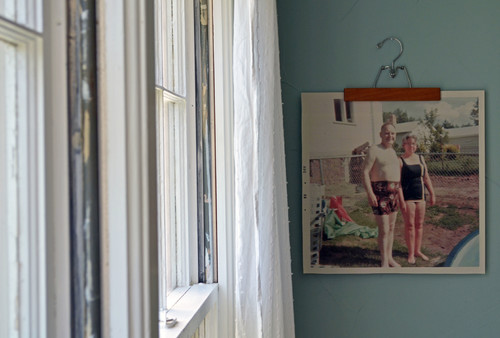When the child is the one charged with helping the parents downsize, these guidelines can smooth the process.
Many seniors eventually need to downsize to a smaller space, whether to a retirement community, a nursing facility or a room in a family member's home. Often, the task of decluttering and packing falls to their children.
If you're the person faced with going through an aging parent's belongings, it may be tempting to rent a storage unit and just pack it all away. However, that can be an expensive way to merely delay the inevitable. Instead, I recommend you start the decluttering process as soon as possible. Here are some tips to help you through it.
1. Acknowledge the true magnitude of the task. Moving from a home filled with years of memories can be a very emotional process for your parents. Not only do they have to downsize the physical memories of perhaps as long as a lifetime, but moving may also summon unwanted reminders of their mortality.
For both parent and child, decluttering takes patience. And for the child especially, it can be difficult to stay motivated, since you won't directly reap the rewards of a tidier space. Further, your decluttering standards may be different than those of your parents. What you consider trash may be your parents' treasures, and this can sometimes lead to friction. It's important, though, to involve your parents in the decision-making process rather than taking over completely. Soliciting their input and accommodating their desires is a way to show them you value their decisions and respect their belongings.
So before you get started, mentally prepare yourself for what's to come. Know that some items may be easy to declutter, such as clothing that doesn't fit. Others will take more time, patience and thought.
2. Schedule bite-sized work sessions. Decluttering is time-consuming, and it can be tiring for aging parents. If time permits before the move, space out your sessions so you and your parents can maintain the energy to complete the entire house. I recommend no more than four hours at a time, and perhaps just two to three times per week. This schedule allows for a balance between making efficient use of your time and not exhausting your parents.
3. Understand your parents' lifestyle. Getting a snapshot of how your parents plan to live in their new home will help you narrow down what they keep - with the goal of retaining only what they actually love or need. Even if you think you understand their lifestyle already, it can be helpful to sit down together and sketch out a few details that can serve as guidance as you sort.
For example, if your parents typically launder their clothes once a week, then 10 to 14 sets of clothing for each season would be more than enough to last between washes. If they won't be entertaining at their new location, they may feel confident donating their punch bowls and tablecloths. If formal events are few and far between, then three to four comfortable formal outfits may suffice.
Below are some questions you could use as a starting point for your discussion with your parents. You could even use their answers to guide a first pass at eliminating irrelevant items on your own - leaving fewer decisions for your parents to make.
- What type of clothing do you need? (Daily comfort wear? Weekly church outfits? Occasional formal outfits?)
- What is your current range of clothing sizes? Is it OK to donate all clothing outside of this range?
- To what extent will you be cooking and baking?
- Will you be entertaining? If so, what would be the maximum number of guests?
- Which suitcases and bags are no longer practical for travel (too large to manage, lacking wheels)?
- Will you want to decorate seasonally?
- Which books do you still read and which music do you still listen to?
4. Start with the least sentimental items. As with most things, practice makes perfect. My clients have found that the decision to keep, toss, sell or donate becomes easier the more you practice. Starting your decluttering process with the least sentimental items, such as linens and clothing, and working your way toward the most sentimental, such as photos and letters, can be a helpful way to ease into harder decision-making territory.
5. Declutter by category rather than room. Separating your decluttering into categories is helpful in terms of keeping your parents - and yourself - motivated and focused. It's easier to make decisions when items are grouped, as this helps you see all at once how many belongings you're dealing with. Also, you can all feel a sense of accomplishment with the completion of each category. I recommend separating items into the smallest categories possible. For example, instead of creating a category of tops, separate the items further into short sleeves, long sleeves, sweaters. Accessories can be separated into belts, hats, scarves and handbags.
6. Keep only sentimental items that will be displayed. Many of my clients have a hard time parting with sentimental memorabilia. But the truth is, some of these items have been buried in their houses for decades. I usually encourage them to keep only the items they'll have out. After all, memorabilia can't be enjoyed while hidden away, and disposing of the items doesn't diminish the memories associated with them.
One possible way to ease the permanence of losing sentimental items is to take photographs of them. However, I don't recommend this in cases where the photograph can't be filed away immediately, whether in a digital album or a physical scrapbook. If there is no defined location for the photograph, whether digital or physical, then it becomes clutter. Also, if it's likely that looking at these photographs will bring on feelings of regret for your parents, I also don't recommend this method.
7. Take charge of your childhood items. If your parents have saved all of your childhood memorabilia, they may be willing to turn those items over to you for sorting through. This can be quite helpful for parents who are overwhelmed with culling their own possessions. Now is also the time to remove any of your adult possessions that have been stored in their house.
8. Remove unwanted items from the property. You haven't truly finished decluttering until all the unwanted items are no longer in your parents' house. Consider ordering a dumpster for trash, scheduling a charitable organization to pick up donations and selling items at a consignment store or online. Although it would be wonderful to earn money by selling some items, if you don't have time to list them or your items don't sell quickly, permit yourself to donate instead. It's important to keep unwanted possessions moving as you continue the decluttering process, as storing them in the house may hinder progress.
9. Treasure this quality time with your parents. Decluttering is undoubtedly hard work, and tensions often arise amid differing viewpoints. So try to adjust your perspective when these moments inevitably come. Instead of viewing the task as a chore, consider it a special time spent with your parents. You may even hear some priceless stories about their youth and your childhood - especially if you maintain a patient attitude, and if you take the time to ask.
Also See:













